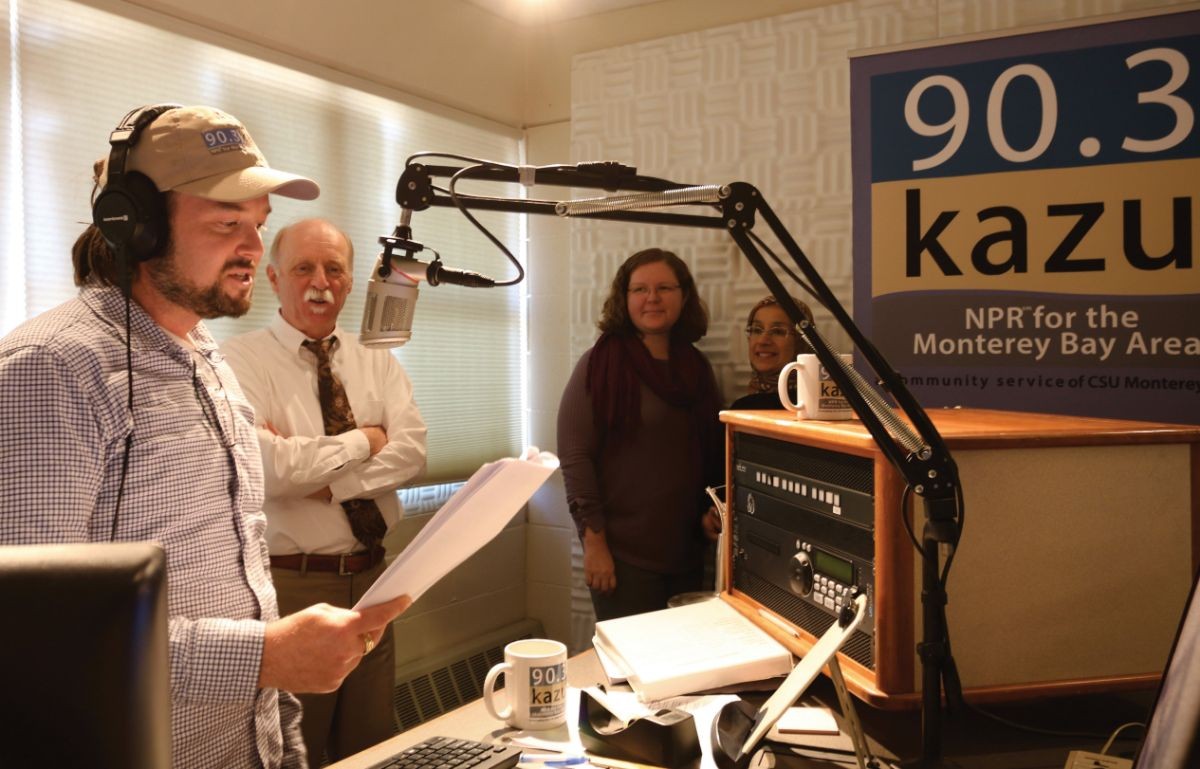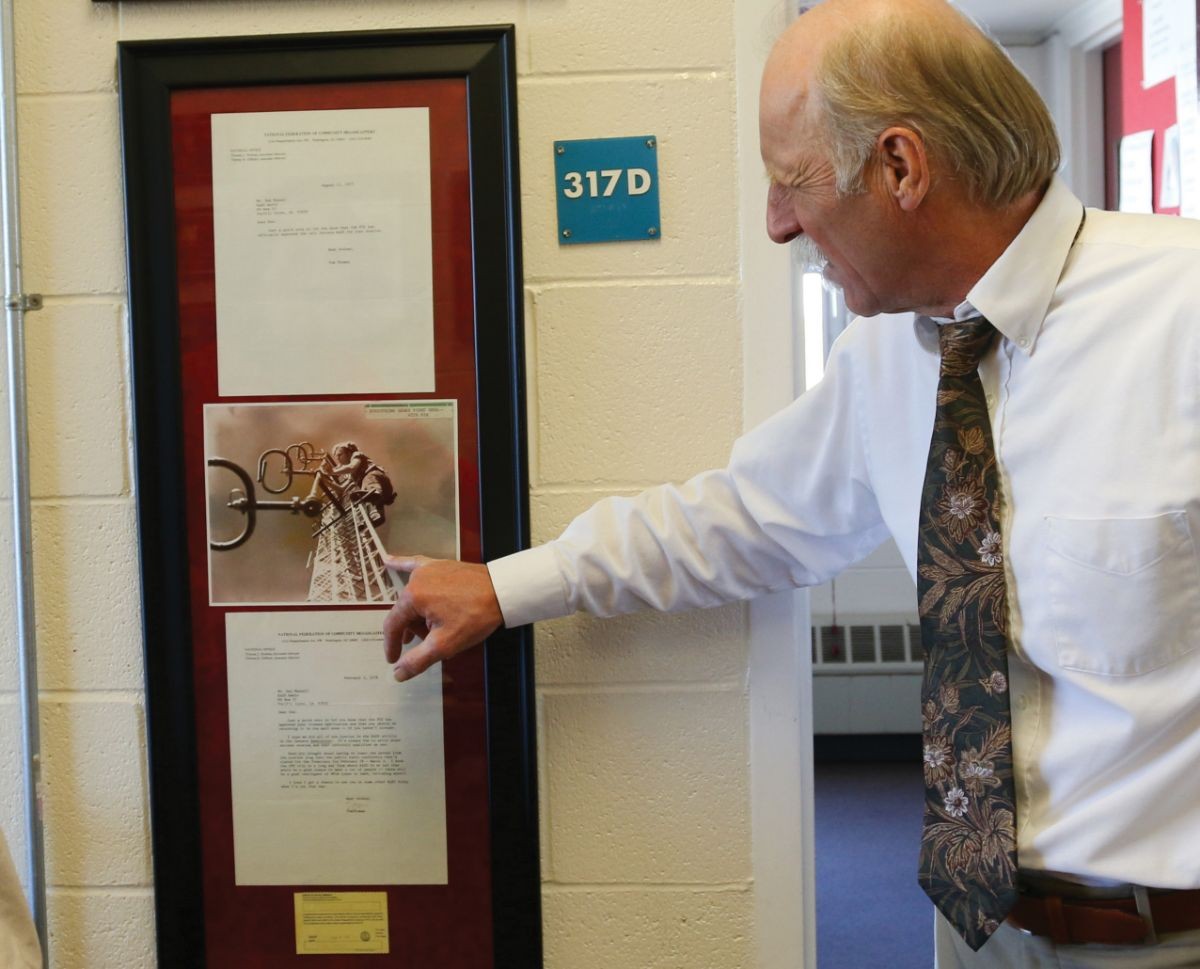CSUMB Magazine
Staying Tuned

By James Tinney
Published Feb. 2, 2019
An investment in a struggling radio station back in 2000 continues to produce benefits for Cal State Monterey Bay and a growing listener base nearly two decades later.
The station is 90.3 KAZU, the Monterey Bay area’s member-supported National Public Radio (NPR) affiliate housed in modest offices on the CSUMB campus.
Station manager Mik Benedek said KAZU currently has about 75,000 listeners a week and is the top station in the market among listeners with an undergraduate or advanced degree.
Our goal is to sound like a major market station, with that professionalism, but at the same time have fun doing it.— Mik Benedek
“Overall, it is among the top three or four stations in the market, which is amazing for a public news and information station.”
“The staff is just an exceptional group of individuals. The way we work together somehow comes out in the presentation and what people hear. It’s intangible. But I really think the cohesiveness of the group does manifest itself in how the station is received and why we are successful,” Benedek said.
“Our goal is to sound like a major market station, with that professionalism, but at the same time have fun doing it.”
Listeners and Members
At a time when news is an increasingly divisive topic, KAZU has built an expanding audience of listeners who do more than just tune in. They also contribute.
Noel Freitas, KAZU membership director and a CSUMB alum, reports that membership dues increased 12 percent in the 2017-18 fiscal year. That comes on top of increases of 29.5 percent and 14.4 percent the previous two fiscal years.

Benedek said support from members makes up more than 60 percent of the station’s income. The second largest source is underwriting — companies and non-profits receive on-air acknowledgements in return for contributions — and grants from the Corporation for Public Broadcasting.
KAZU’s license is held by the CSUMB University Corporation, a 501(c)(3) nonprofit that administers the business functions of the university. The corporation provides KAZU rent-free office space and human resources, IT and accounting support. However, Benedek stresses, it does not provide any cash subsidy for the station, which has long since retired its debt and now operates in the black.
Founded in Pacific Grove
The station’s strong listenership figures and financial health may have been hard to predict back when the University Corporation acquired the station license in 2000 when it assumed the station’s liabilities, estimated at about $150,000.
KAZU was founded in Pacific Grove as a 10-watt independent community station in 1977. When the university, led by its first president Peter Smith, took over the station, KAZU featured an eclectic mix of music programming and was still housed in offices in Pacific Grove.
KAZU shifted its format to NPR — over the objections of some loyal fans of the station — in 2002.
Doug McKnight, who began as KAZU development director in 2004 and served as station manager from 2008 to 2011, said Smith once told him that for a university to be recognized in the community, it needed a radio station and an athletic program.
McKnight said, “When we started here, this was a very isolated place. Almost nobody knew much about the university. They were terrified to come out here because they would get lost and eaten by coyotes. So we were a way to reach out to them.”
Lifelong Learning
“It (the radio station) also helps fulfill the university’s obligation to lifelong learning. Our programs are educational in nature. They are not only news but science and the arts and culture. So we are part of that whole idea that when you leave the university, you continue to learn,” said McKnight, who continues to serve as a fill-in on-air host and news reporter.
Benedek said the station has eight full-time employees, and typically has four or five student interns who assist in graphic design, production and business development.
It (the radio station) also helps fulfill the university’s obligation to lifelong learning. Our programs are educational in nature. They are not only news but science and the arts and culture.— Doug McKnight
KAZU’s listenership numbers have received a bit of a boost in the past year with the demise of KUSP, the Santa Cruz-based NPR station, which filed for bankruptcy in 2016. Over the years, there had been discussions about a potential merger of the two stations, but no agreement was ever reached.
Benedek said, “Even when KUSP was here, we had a very strong presence in Santa Cruz. Our listenership and our underwriting and our membership are evenly split between Monterey and Santa Cruz counties. We are very cognizant of the importance of Santa Cruz County.”
Far-Flung Listeners
Along with broadcasting over the FM dial, KAZU streams its content over the internet. That has earned the station some listeners in far-flung places.
“We got a donation from a ski guide in Canada. We get emails from various people around the world and around the country that happen to like our programming lineup,” said Benedek, who estimates about 10 percent of the station’s listeners tune in through the internet.
“Smart speakers have really brought radio back into the home because you can simply say, ‘Alexa, I want to play KAZU’ or ‘Hey Google, play 90.3 KAZU’ and the station is on,” Benedek said. “Conversely, we have to compete against all the other radio stations people can listen to as well.”
McKnight said, “It (KAZU) will stay relevant because of this direct connection we have with listeners. And because NPR, through either luck or wisdom, made an investment in news.”
“The question is, how do we adapt what we have so that it is available on other platforms — multiple platforms, multiple delivery systems.”
Seeking Pledges
Along with the station’s focus on local news, and the local hosts who provide announcements, weather and traffic updates during NPR programming, KAZU also connects to its listeners through its three yearly pledge drives.
Although some may find pledge breaks annoying, Benedek says the process has value.
“When we actually talk to the listeners, they do have a feeling of seeing behind the curtain, I think that is an opportunity and not an intrusion. I think that bonds us to the community and the pledge drives have been very successful,” he said.
“More than commercial radio, we have direct contact with the listeners. They pay us. We don’t go through advertisers; we go directly to the listeners. So they ought to be the first thing we think about,” McKnight said.
Read a related story about KAZU's first national award won by reporter Erika Mahoney: Reporting Excellence.